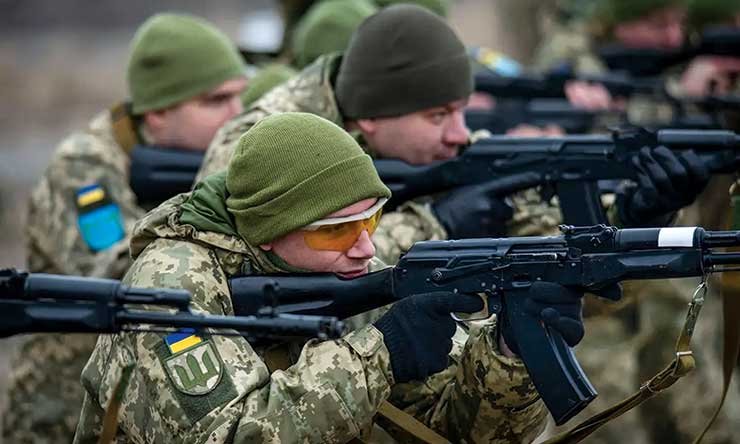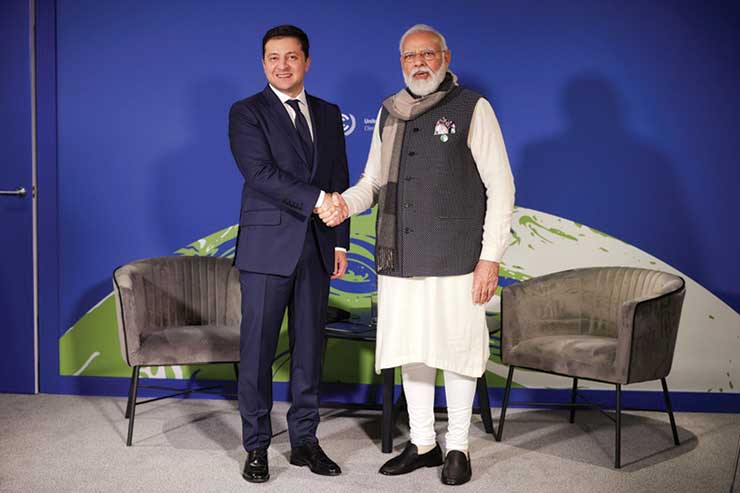The Ukraine-Russia war may well be a watershed in international relations signalling the emergence of new paradigms and alignments in the world. Putin’s cold-blooded pursuit of aggression as a means of achieving political ends has perhaps few parallels in recent history. The Clausewitzian precept of war ‘as a continuation of policy with other means’ and ‘as an act of force to compel our enemy to do our will’ seems to have an ardent practitioner in Putin whose gamble with power has all the makings of Russian roulette, which could seriously undermine his political future.
Emerging from the shadows of the cold war Russia had the option of integrating itself with Western Europe and transforming itself into an economic powerhouse using its abundant natural resources. But it chose to be a kleptocracy of oligarchs trying to play the power game using the huge nuclear arsenal inherited from the Soviet Union, the veto power in the UN and the cloak and dagger ways of its powerful state instruments like the KGB. More than any other industry, it was Russia’s defence industry, which was prominently churning out lethal products like the hypersonic missile. Russia’s invasion of Ukraine in order to compel the nation to toe its line in the teeth of severe resistance from the NATO powers has given the world its first glimpse of nuclear terror unleashed by an authoritarian head of state with absolutely no regard for a rule-based order, with zero accountability to any political institution.
Nuclear option
Putin seems to be harking back to the Soviet era in terms of its territorial spread and heft. Ukraine from the Soviet days was both an industrial and agricultural powerhouse driving the Soviet military-industrial engine and perhaps in his scheme of things Russia needs Ukraine badly. But the death and destruction that Russia has rained on Ukraine have only made Ukrainians more nationalistic than ever before hell-bent on resisting the Russian army to the last soldier. Indications are that this is going to be a prolonged struggle and should the Russian army experience more reverses Putin might find himself with his back to the wall having to contend with serious domestic opposition given the crippling effects of the sanctions. This again is a very dangerous situation that might lead to desperate options like the use of tactical nuclear weapons, which can escalate tensions with disastrous consequences.
Ukraine has become a hot theatre of a proxy war between Russia and the NATO powers. With economic sanctions calculated to cripple the Russian economy there have been many winners and losers. Many east European countries like Poland are facing a huge refugee crisis. The sanctions have by and large failed to divide NATO as calculated by Putin. As always this war has been grist to the US mill. When war clouds loom on the horizon it is the defence industry of the US that is the biggest beneficiary. With even countries like Sweden and Finland likely to seek NATO membership and with many others likely to follow suit the arms industry in the US will skim off cream as never before. With the decision to phase out Russian oil and gas from Europe, the crisis has led to an unprecedented increase in oil prices, which has badly affected countries like India which need to review its projected GDP growth rate for the current year. But here again, the winner is the US whose shale oil industry needs high international prices to thrive in the market. Even President Biden seems to have improved his ratings significantly.

For China, this is a test case. Putin’s relentless bombardment of Ukraine with the NATO countries watching from the sidelines should necessarily embolden China to be more aggressive on Taiwan. Taiwan is under the US umbrella but with no assurance of US intervention in the event of a Chinese invasion. Regional partnerships like the QUAD may also not get involved militarily. The Indo-Pacific region may very well witness many more instances of Chinese audacity.
The emergence of a multipolar world and the use of nuclear blackmail as an instrument of state policy to achieve political objectives have become more explicit than ever. Countries in conflict with nuclear powers will be pushed into alliances for fear of existential threats or seek to get nuclear weapons/cover for themselves. NATO is likely to expand and the US defence industry will see unprecedented growth. The emergence of authoritarian states without accountability to their people will be a grave challenge to democracy, international order and peace.
National interests
The conflict has put Indian diplomacy to a severe test. As the largest democracy in the world and as an ardent upholder of peace, sovereignty and territorial integrity, India’s compulsions not to take an open stance against Russia have damaged its credentials notwithstanding its condemnation of killings in Ukraine and despatch of humanitarian assistance to that country. We may rightfully feel happy about our boldness in taking an independent stand keeping in view China’s aggression and our dire dependence on Russia for military hardware but in reality, there was hardly any choice.

The paramount objective of diplomacy is protecting national interests even if it means getting bruised in the process. Our strategic independence from Russia is as important as that with the USA and the West. As Putin’s actions become more and more indefensible India will find it difficult to play the abstention game because this conflict has elicited overwhelming moral support for the underdog from all over the world. For the moment India and US seem to have put their differences aside and moved ahead but international opinion will be unforgiving.
Decoupling from Russia on the defence front should be India’s priority. The current efforts at self-reliance are laudable but it will need hard work and imagination to shun dependence and develop our own technological base. Walking into the Russian embrace after the euphoric moments of 1971 was the biggest mistake we committed. The MoD never had a long term strategy for self-reliance despite some of the technological breakthroughs we have had in areas like strategic arms, space or nuclear energy. The Russian connection never seemed to be ideal for India’s defence industry as the Russians never co-operated wholeheartedly when it came to building capabilities within India even for servicing its own equipment. Efforts at forging alliances with the Russian defence firms for manufacturing even components of major equipment did not bear fruit. Engaging with India constructively in defence manufacturing was not among the Russian priorities. The latest instance of such indifference was in the case of the Kamov 226T utility helicopter, which was to be manufactured in India through an India-Russia joint venture. From the beginning, Russia was keen on selling the equipment rather than manufacturing it in India. The negotiations were reported to have failed on account of the Russian unwillingness to be more liberal in technology transfer — an attitude totally inconsistent with the intimacy of a four-decade strategic partnership.
India faces a real threat from China. With Russia compelled to come to a closer partnership with China because of the sanctions, there is every reason why we should re-examine our choices with a view to countering China effectively. Many feel that India’s natural place is with the democracies of the world at a time when authoritarianism threatens to plunge the whole world into perilous conflict.
–The writer is a former Defence Secretary. The views expressed are personal and do not necessarily reflect the views of Raksha Anirveda





